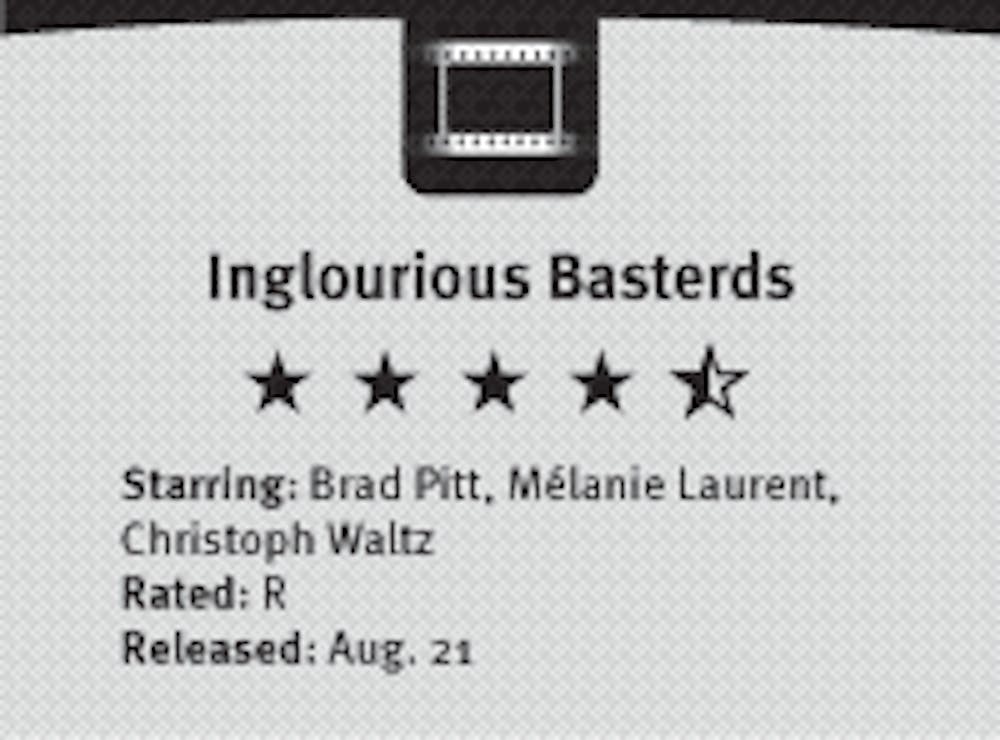Tarantino leaves his mark with Basterds

Quentin Tarantino's name carries a certain vicious connotation. His films are often gruesomely sharp, full of blood-splattered baddies and two-times-too-witty good guys. With his latest effort, Inglourious Basterds, a long, sprawling war-based epic, Tarantino rounds into form. Basterds is Tarantino at his best, and it's awesome.The film takes place "Once upon a time ... in Nazi-occupied France." After escaping a Nazi raid on the house hiding her family, Shosanna Dreyfus (Paris's Mélanie Laurent) establishes herself in Paris, taking on a new identity and becoming the owner of a cinema, where she reluctantly agrees to host a premiere screening of a new propaganda film for the upper echelons of Nazi leadership.
Meanwhile, First Lieutenant Aldo Raine (The Curious Case of Benjamin Button's Brad Pitt) and a group of Jewish-American soldiers dubbing themselves "The Basterds" have been busy sloshing across France, ambushing Nazi patrols and scalping the dead in order to strike fear into the Nazi war machine. When word reaches them of the film premiere and its select guests, the cinema quickly begins to turn into a Parisian O.K. Corral.
Featuring one of the most diverse and eclectic casts in recent memory, Inglourious Basterds is overflowing with vivid and memorable characters, all played by a host of capable and believable actors. At the top of that list is the charmingly evil Colonel Hans Landa, played by Austrian actor Christoph Waltz. Landa is a talented interlocutor with a penchant for finding Jews still in hiding, earning him the nickname "The Jew Hunter." Waltz dazzles by effortlessly switching back and forth between the jocular and moribund sides of Landa, all the while keeping the audience hanging on his every word.
In fact, the entire first chapter of the film consists of a simple conversation between Landa and a dairy farmer. While this may sound like a recipe for cinematic disaster, Waltz establishes a commanding presence on the screen and has no problem engaging with the audience, even if he is speaking French half the time.
Raine, with Pitt doing his best Marlon Brando scowl, is the other standout of the film, providing a trove of quotable one-liners. ("When you go home, are you planning on taking that Nazi uniform off?") Raine is delightfully dim-witted, yet still manages to hold his own in discussions with some of the film's more intellectual characters.
Intellectualism is a staple of this film, and, for a movie set during World War II, there are surprisingly few action setpieces. Instead, the majority of the film is driven by dialogue and character interaction. If this were any other director, the audience would be in for a snooze-fest, but Tarantino has penned such tight and natural dialogue that it is a treat to watch the characters converse about everything from the particulars of Operation Kino to their favorite directors.
Hand-in-hand with the film's length and strong emphasis on dialogue is the cinematographic style of the film. There are no random Michael Bay, middle-of-scene jump cuts to be found here. The style of the shots is very methodical, composed and organized, giving attention where attention is due. Only when things heat up during action scenes does Tarantino whip out the crash zooms, quick pans and split-second shots.
Basterds is as close as you can get to actually "watching" a book, complete with narrator asides, anecdotes, flashbacks and chapter titles. And even though the plot is uncharacteristically chronological for a Tarantino movie, just like any good book, each chapter ends with a cliffhanger before switching to a new subject, keeping the audience guessing as to what will happen next.
Perhaps the film's greatest feature is also its only weakness. Tarantino is known for paying homage to various films and genres, and Basterds is no exception, drawing inspiration from spaghetti westerns of the 1960s and French New Wave cinema. Many conversations in the film repeatedly reference period directors and their works, such as Leni Riefenstahl and the like. For a cinephile, it's exciting to see that kind of stuff in a movie, but for the Average Joe it seems like Tarantino is saying, "Hey, look! I know boring details and stuff about old movies!"
That being said, Basterds is still a towering achievement for Tarantino. It's violent, stylized, funny, dark and above all, fantastic. There are no epiphanies to be found here, just pure, blood-soaked cinematic fun.
More from The Rice Thresher

Local Foods launches in newly renovated Brochstein space
Local Foods Market opened at Brochstein Pavilion Nov. 19, replacing comfort food concept Little Kitchen HTX. The opening, previously scheduled for the end of September, also features interior renovations to Brochstein. Local Foods is open from 8 a.m. to 6 p.m. on weekdays and 9 a.m. to 5 p.m. on weekends.

Scan, swipe — sorry
Students may need to swipe their Rice IDs through scanners before entering future public parties, said dean of undergraduates Bridget Gorman. This possible policy change is not finalized, but in discussion among student activities and crisis management teams.

Energy summit talks the policy behind power
The 16th annual Rice Energy Finance Summit was held at Jones Business School Nov. 15. Speakers from the energy industry discussed topics including renewable energy, the Texas power grid and the future of energy policy under a second Trump administration.

Please note All comments are eligible for publication by The Rice Thresher.